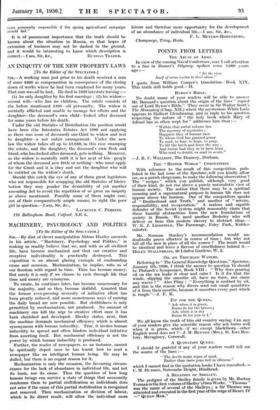POINTS FROM LETTERS
THE ABUSE OF ARMS.
In view of the coming Naval Conference, may I call attention to a line in Homer's Odyssey, spoken some 3,000 years ago :—
"for the view
Itself of an incite* to their abuse."
I quote from William Cowper's translation—Book XIX. This truth still holds good.—H.
BYRON'S BIBLE.
No doubt many of your readers will be able to answer Mr. Barnard's question about the origin of the lines " copied out of Lord Byron's Bible." They occur in Sir Walter Scott's The Monastery (Chap. XII.) where the mysterious White Lady appears to Halbert Glendinning, and in reply to his question respecting the nature of " the holy book which Mary of Adenel has so often wept for " addresses him thus :— " Within that awful volume lies
The mystery of mysteries ; Happiest they of human race To whom God has granted grace To read, to fear, to hope, to pray, To lift the latch and force the way ; And better had they ne'er been born Who read to doubt, or read to scorn."
—.I. E. C. WELLDON, The Deanery, Durham.
Tim " BETTER WORLD " COMPETITION
With reference to the result of this competition, pub- lished in the last issue of the Spectator, will you kindly allow me, as a parish clergyman, to make the following observation ? The " recipes " which you publish, although very good of their kind, do not rise above a purely naturalistic view of human society. The notion that there may be a spiritual meaning and a supernatural purpose in human life does not appear above the horizon. One of the competitors speaks of " Brotherhood and Truth," and another of " service, responsibility, and co-operation." A zealous and capable defender of the Soviet system might reasonably claim that these baneful abstractions form the new foundations of society in Russia. We need another Berkeley who will deliver us from this modern slavery to abstract ideas.— W. E. J. LINDFIELD, The Parsonage, Foley Park, Kidder- minster.
Mr. Norman Stuckey's recommendation would un- doubtedly prove effective in course of time ; but why not kill all the men in place of all the women ? The result would be identical and leave a flavour of unselfishness behind it.— HELEN STALLYBRASS, 20 Linden Gardens, W. 2.
OIL ON TROUBLED WATERS.
Referring to " The General Knowledge Questions," Spectator, January 4th, 1930, I think the answer to question 13 should be Plutarch's Symposiacs, Book VIII : " Why does pouring oil on the sea make it clear and calm ? Is it for that the winds, slipping the smoothe oil, have no force, nor cause
any waves Also Pliny : " Everything is soothed by oil, and this is the reason why divers send out small quantities of it from their mouths, because it smoothes every part which is rough."—J. F. K.
FIT FOR THE QUEEN. " Ash when it is green, Burns fit for the Queen ; Aeh, when it is dry
Burns fit for you or I."
We all know the truth of this old country saying. Can any of your readers give the scientific reason why ash burns well when it is green, which—if we except blackthorn—other English wood does not ?—J. M. BEYNON (Mrs.), St. Ewe Rec- tory, Mevagissey, Cornwall.
A QUOTATION QUERY.
I should be grateful if any of your readers could tell me the source of the lines :—
" The devils make ropes of sand,
Rather than taste pure hell in idleness."
which I cannot find in the quotation books I have consulted.—. C. M. HUDSON, Nuteombe Height, Hindhead.
A RELATION OF SHELLEY.
The pedigree of the Shelley family is given by Mr. Burton Forman in the first volume of Shelley's Own Works. " Thomas " was the name of several of the Shelleys • a Sir Thomas was attainted and executed in the first year of ihe reign of Henry IV —" QUEEN Man."






































 Previous page
Previous page